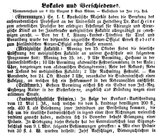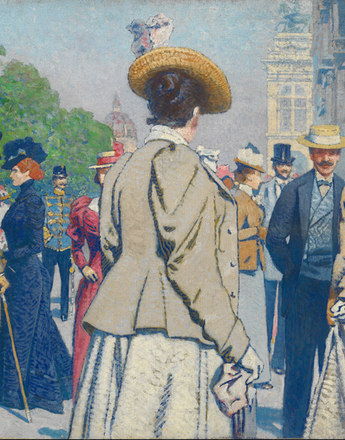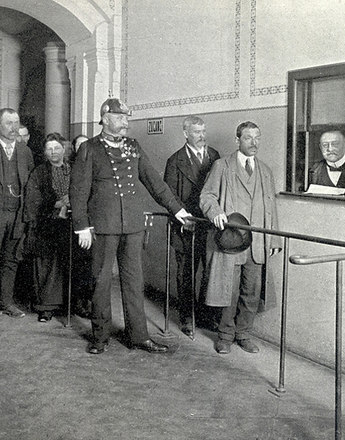Suicide, questions in parliament and pathological military discourse
-

Colonel General Robert Freiherr von Georgi,, Imperial-Royal National Minister of Defence, portrait photograph
Copyright: Wienbibliothek im Rathaus
Partner: Wienbibliothek im Rathaus – Vienna Library in the City Hall -

“Soldier suicides in Galicia”, newspaper report from the Arbeiterzeitung of 28 November 1913
Copyright: ÖNB/ANNO
Partner: Austrian National Library -

Newspaper report on a soldier’s suicide from Innsbrucker Nachrichten of 20 October 1869
Copyright: ÖNB/ANNO
Partner: Austrian National Library
The consequences of the often brutal training of soldiers and the way in which the military encroached increasingly on other social spheres are illustrated by the questions in parliament regarding suicides in the Austro-Hungarian army. They were often preceded by brutality. The military authorities tried to repel the criticism by referring to contemporary ideas of psychophysiological pathology.
The electoral reform of 1907 abolished the class system of voting. The Reichsrat election that year brought a massive shift towards the Social Democrats and Christian Socialists in the Austrian half of the empire. The Social Democrats made their presence felt through a number of questions in parliament about the horrifyingly high suicide rate in the Austro-Hungarian army. Social Democrat member Hermann Liebermann spoke on behalf of his party at a session of the Reichsrat in November 1913: "We members have the duty to protect our nation’s sons and children. [applause] … and we will discover what is causing the downfall of many of our young soldiers. […] We will point to this wound and we will speak often of the causes of these suicides". Between 1907 and the suspension of the Reichsrat in 1914, the mistreatment of soldiers, bullying and tormenting by superiors were highlighted in a number of questions. The serious newspapers also reported increasingly about the “dreadful state of militarism”.
The military authorities reacted to these questions in parliament by trying to turn the suicide victims into pathological cases. It was not the military training that was causing the “self-disembodiment”, they said, but the disposition of the suicide victims. They referred to studies by the forensic scientist Hermann Pfeiffer, who wrote that "[...] suicide is nothing other than an abnormal reaction by sick persons to external or internal insults that the defence mechanism of a mentally and physically healthy person would energetically repulse." The Imperial and Royal Minister of Defence General Friedrich Freiheer von Georgi also subscribed to this interpretation. He claimed that post-mortems had shown that suicide victims had organic anomalies that explained their tendency to “self-destruction”. He pointed out that the army administration was generally powerless in the case of “madness” or “mental illness” unrelated to military service.
This strategy of turning the suicides into a pathology had only moderate success with the members of parliament. It was well known that a large proportion of the suicides had been preceded by mistreatment. The mild punishments that superiors were given in the event of proven mistreatment of soldiers was also criticised by some officers.
In spite of this, the military authorities went onto the offensive in 1913/14: Georgi appealed to the civilian population not to destabilise future soldiers mentally with “horror stories” about their military service. Anti-military articles and malicious lies in the newspapers not only unsettled the recruits but also defamed the institution of the military in itself.
Translation: Nick Somers
Leidinger, Hannes: Suizid und Militär. Debatten – Ursachenforschung – Reichsratsinterpellationen 1907-1914, in: Cole, Laurence/Hämmerle, Christa/Scheutz, Martin (Hrsg.): Glanz, Gewalt, Gehorsam. Militär und Gesellschaft in der Habsburgermonarchie (1880 bis 1918), Essen 2011, 337-358
Quotes:
"We members have the duty...": Sten. Prot. AH RR, 181. Sitzung der XXI. Session vom 28.11.1913, quoted from: Leidinger, Hannes: Suizid und Militär. Debatten – Ursachenforschung – Reichsratsinterpellationen 1907-1914, in: Cole, Laurence/Hämmerle, Christa/Scheutz, Martin (Hrsg.): Glanz, Gewalt, Gehorsam. Militär und Gesellschaft in der Habsburgermonarchie (1880 bis 1918), Essen 2011, 345 (Translation)
"[...] suicide is nothing other than...": Peiffer, Hermann, quoted from: ibid., 351 (Translation)
-
Chapters
- Militarisation and nation-building: an interaction
- From the Theresian reforms to the battle of Königgrätz
- Universal conscription as the fundamental militarisation of society
- Military training: violence as a military instrument for achieving obedience
- Suicide, questions in parliament and pathological military discourse
- Anti-militarism in Bohemia: “The fit are enslaved”
- Total mobilisation – the First World War and special measures





